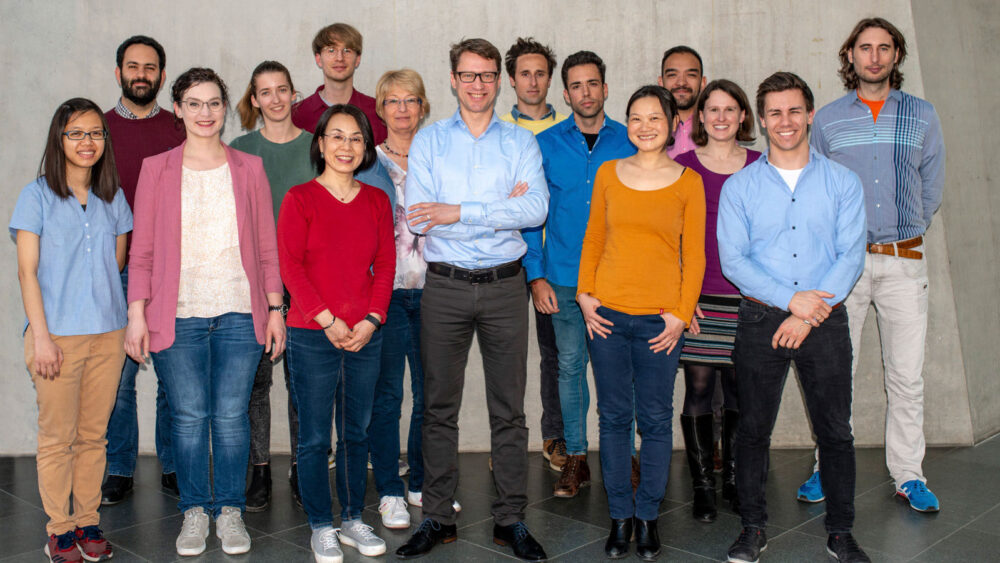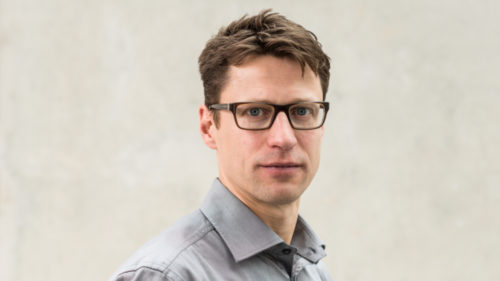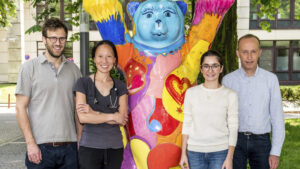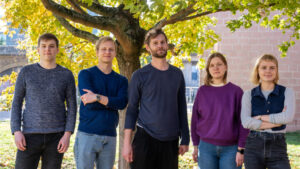

Löhning lab
We aim to biologically regenerate cartilage by selection and reprogramming of chondrocytes
Pitzer Laboratory of Osteoarthritis Research
The Pitzer Laboratory of Osteoarthritis Research investigates the cellular and molecular mechanisms leading to the development of osteoarthritis (OA). OA is the most frequently occurring joint disease among adults worldwide, it leads to progressive cartilage loss and is often accompanied by inflammatory processes. Recent studies indicate dysfunctional molecular signaling within the cartilage-producing cells of the joints, the chondrocytes. So far, the chondrocytes’ in situ biology is not well understood.
Chondrocytes reside in the joint cartilage layers in different arrangements and with varying types of metabolism. It is not clear yet whether this points to a homogenous population or to differentiated subtypes. Using a 3D-culture system of human chondrocytes that simulates a hypoxic environment, we could show that the activation of specific immune-related receptors leads to impaired cartilage production and altered metabolic activity. Now we investigate a possible connection to the development or progression of OA. Here, our group’s accumulated knowledge on the (re-) programming of T cell subtypes will be transferred to chondrocytes and the field of OA research.
Since we consider the joint as a functional unit, we also analyse the cells building up the bone mass and vascular system. In addition, we examine the infrapatellar fat pad, synovial tissue, and synovial fluid of the material from primary human donors we receive from our colleagues at the Center for Musculoskeletal Surgery of the Charité. After assessing the active genes in specific cell subtypes, we identified a candidate gene that could prove to be important for the therapy of painful ossification processes and osteophyte formation in OA.
In previous studies, we identified central cytokines and key transcription factors controlling the differentiation of T cells into subtypes (Bonilla et al., Science 2012; Peine et al., PLoS Biol. 2013; Baumann et al., PNAS 2015; Peine et al., Trends Immunol. 2016) and used this understanding of molecular processes to reprogram mature T cells into new stable phenotypes with additional functions (Hegazy et al., Immunity 2010). More recently, we showed a quantitative cytokine memory in individual cells. This means that a cell memorizes and stably maintains its individual production amount of a given cytokine (Helmstetter et al., Immunity 2015). We suggest that chondrocytes feature similar subtypes, differentiation programs, and possibilities of reprogramming. Ultimately, we want to reprogram the chondrocyte phenotypes that lead to the development of OA in patients in such a way as to achieve a long-lasting cartilage build-up.
Keywords
Osteoarthritis pathogenesis
Chondrocyte differentiation
Bone cell development
Bone angiogenesis
Lymphocyte differentiation
Immunological memory

Group leader
Univ.Prof. Dr. rer. nat. Max Löhning
Scientists
Dr. rer. nat. Tobias Brunner
Dr. rer. nat. Maria Dzamukova
Ph.D. Philippe Saikali
Dr. rer. nat. Ping Shen
PhD students
Yujie Dai
Nayar Durán
Xiaohui Liu
Adrian Madrigal-Avilés
Dominik Niesen
Valerie Plajer
Sebastian Serve
Jelizaveta Fadejeva
Technicians
Vivien Holecska
Isabel Panse
Peihua Wu
Team Assistance
Ellen Heinemann
- Dzamukova, M., T. Brunner, J. Miotla-Zarebska, F. Heinrich, L. Brylka, M.F. Mashreghi, A. Kusumbe, R. Kühn, T. Schinke, T. Vincent & M. Löhning. Mechanical forces switch blood vessel subtypes to arrest adolescent bone growth. In Review. Preprint on Research Square, DOI: 10.21203/rs.3.rs-120475/v1.
- Wolter*, A., A.E. Rapp*, M. Durst, L. Hildebrand, M. Löhning, F. Buttgereit, K. Schmidt-Bleek, P. Jirkof & A. Lang. 2021. Systematic review on the reporting accuracy of experimental details in publications using mouse femoral fracture models. Bone 152, 116088. )*Shared first authors.
- Muñoz, M., A.N. Hegazy, T.M. Brunner, V. Holecska, R.M. Marek, A. Fröhlich & M. Löhning. 2021. Th2 cells lacking T-bet suppress naive and memory T cell responses via IL-10. Proceedings of the National Academy of Sciences USA 118, e2002787118.
- Baumann, C., A. Fröhlich, T.M. Brunner, V. Holecska, D.D. Pinschewer & M. Löhning. Memory CD8+ T cell protection from viral reinfection depends on interleukin-33 alarmin signals. Frontiers in Immunology 10, 1833.
- Peine, M., R.M. Marek & M. Löhning. IL-33 in T cell differentiation, function, and immune homeostasis. Trends in Immunology 37, 321-333.
- Siede J., A. Fröhlich, A. Datsi, A.N. Hegazy, D.V. Varga, V. Holecska, H. Saito, S. Nakae & M. Löhning. 2016. IL-33 receptor-expressing regulatory T cells are highly activated, Th2 biased and suppress CD4 T cell proliferation through IL-10 and TGFβ release. Public Library of Science ONE 11, e0161507.
- Bhattacharya*, A., A.N. Hegazy*, N. Deigendesch, L. Kosack, J. Cupovic, R.K. Kandasamy, A. Hilde-brandt, D. Merkler, A.A. Kühl, B. Vilagos, C. Schliehe, I. Panse, K. Khamina, H. Baazim, I. Arnold, L. Flatz, H.C. Xu, P.A. Lang, A. Aderem, A. Takaoka, G. Superti-Furga, J. Colinge, B. Ludewig, M. Löhning* & A. Bergthaler*. 2015. Superoxide dismutase 1 protects hepatocytes from type I inter-feron-driven oxidative damage. Immunity 43, 974-986. )*Shared first and senior authors.
- Baumann, C., W.V. Bonilla, A. Fröhlich, C. Helmstetter, M. Peine, A.N. Hegazy, D.D. Pinschewer & M. Löhning. 2015. T-bet– and Stat4–dependent IL-33 receptor expression directly promotes antiviral Th1 cell responses. Proceedings of the National Academy of Sciences USA 112, 4056-4061.
- Helmstetter, C., M. Floßdorf, M. Peine, A. Kupz, J. Zhu, A.N. Hegazy, M.A. Duque-Correa, Q. Zhang, Y. Vainshtein, A. Radbruch, S.H. Kaufmann, W.E. Paul, T. Höfer & M. Löhning. 2015. Individual T helper cells have a quantitative cytokine memory. Immunity 42, 108-122.
- Schiering, C., T. Krausgruber, A. Chomka, A. Fröhlich, K. Adelmann, E.A. Wohlfert, A.N. Hegazy, O. Harrison, T. Griseri, J. Bollrath, M. Löhning, Y. Belkaid, P.G. Fallon & F. Powrie. 2014. The alarmin interleukin-33 promotes regulatory T cell function in the intestine. Nature 513, 564-568.
- Peine, M., S. Rausch, C. Helmstetter, A. Fröhlich, A.N. Hegazy, A. Kühl, C.G. Grevelding, T. Höfer, S. Hartmann & M. Löhning. Stable T-bet+GATA-3+ Th1/Th2 hybrid cells arise in vivo, can develop directly from naive precursors, and limit immunopathologic inflammation. PLOS Biology 11, e1001633.
- Bonilla*, W.V., A. Fröhlich*, K. Senn, S. Kallert, M. Fernandez, S. Johnson, M. Kreutzfeldt, A.N. Hegazy, C. Schrick, P.G. Fallon, R. Klemenz, S. Nakae, H. Adler, D. Merkler, M. Löhning* & D.D. Pinschewer*. 2012. The alarmin interleukin-33 drives protective antiviral CD8+ T cell responses. Science 335, 984-989 )*Shared first and senior authors.
- Chu, V.T., A. Fröhlich, G. Steinhauser, T. Scheel, T. Roch, S. Fillatreau, J.J. Lee, M. Löhning & C. Berek. Eosinophils are required for the maintenance of plasma cells in the bone marrow. Nature Immunology 12, 151-159.
- Hegazy, A.N., M. Peine, C. Helmstetter, I. Panse, A. Fröhlich, A. Bergthaler, L. Flatz, D.D. Pinschewer, A. Radbruch & M. Löhning. Interferons direct Th2 cell reprogramming to generate a stable GATA-3+T-bet+ cell subset with combined Th2 and Th1 cell functions. Immunity 32, 116-128.
- Löhning, M., A.N. Hegazy, D.D. Pinschewer, D. Busse, K.S. Lang, T. Höfer, A. Radbruch, R.M. Zinkernagel & H. Hengartner. Long-lived virus-reactive memory T cells generated from purified cytokine-secreting T helper type 1 and type 2 effectors. Journal of Experimental Medicine 205, 53-61.
University of Colorado, Denver, CO, USA:
Prof. Dr. Charles A. Dinarello
Kennedy Institute of Rheumatology, University of Oxford, UK:
Prof. Dr. Fiona Powrie
Prof. Dr. Tonia Vincent
Dr. Anjali Kusumbe
NIH, NIAID, Bethesda, MD, USA:
Dr. Jinfang Zhu
Dr. Dragana Janković
University of Tokyo, Japan:
Prof. Dr. Susumu Nakae
Chiba University, Japan:
Prof. Dr. Toshinori Nakayama
ETH & Universitätsspital Zürich, Schweiz:
Prof. Dr. Rolf M. Zinkernagel
Prof. Dr. Hans Hengartner
Universität Basel, Schweiz:
Dr. Weldy Bonilla
Prof. Dr. Daniel D. Pinschewer
Prof. Dr. Mike Recher
Universität Genf, Schweiz:
Prof. Dr. Doron Merkler
Kantonsspital St. Gallen, Schweiz:
Prof. Dr. Lukas Flatz
Universität Lausanne, Schweiz:
Prof. Dr. Sanjiv Luther
Research Center for Molecular Medicine of the Austrian Academy of Science, Wien, Österreich:
Dr. Andreas Bergthaler
Dr. Rolf M. Schwiete Forschungsbereich für Arthrose, Orthopädische Universitätsklinik Friedrichheim, Frankfurt am Main:
Prof. Dr. Andrea Meurer
Prof. Dr. Frank Zaucke
Dr. Anna Rapp
Zentrum für Traumaforschung – Universität Ulm (ZfT Ulm):
Prof. Dr. Anita Ignatius
Institute of Translational Genomics, Helmholtz Zentrum München:
Prof. Dr. Eleftheria Zeggini
Universitätsklinikum Essen:
Prof. Dr. Karl S. Lang
Universität Düsseldorf:
Prof. Dr. Philipp A. Lang
Deutsches Krebsforschungszentrum (DKFZ), Heidelberg:
Prof. Dr. Thomas Höfer
Dr. Christoph Kommer
Dr. Qin Zhang
Systembiology der Entzündung, Universität Bonn:
Prof. Dr. Kevin Thurley
Bundesinstitut für Risikobewertung, Deutsches Zentrum zum Schutz von Versuchstieren (BfR/Bf3R), Berlin:
Dr. Frank Schulze
Tierklinik Bad Langensalza, Forschungszentrum für Medizintechnik und Biotechnologie (fzmb GmbH):
Dr. Dirk Barnewitz
FU Berlin, Veterinärmedizin:
Prof. Dr. Susanne Hartmann
Dr. Sebastian Rausch
MPI für Infektionsbiologie, Berlin:
Prof. Dr. Stefan Kaufmann
Prof. Dr. Arturo Zychlinsky
Dr. Nikolaus Deigendesch
Dr. Andreas Kupz
Charité – Universitätsmedizin Berlin:
Prof. Dr. Gerd-Rüdiger Burmester
Prof. Dr. Frank Buttgereit
Prof. Dr. Dr. Ahmed N. Hegazy
Prof. Dr. Carsten Perka
Prof. Dr. Georg Duda
Prof. Dr. Tobias Winkler
Prof. Dr. Frank Konietschke
Prof. Dr. Joachim Spranger
PD Dr. Thomas Bobbert
PD Dr. Katharina Schmidt-Bleek
PD Dr. Matthias Pumberger
PD Dr. Tobias Jung
Dr. Michael Fuchs
Dr. Tazio Maleitzke
Dr. Clemens Gwinner
Marie-Jacque Reisener
Dr. Timo Gaber
Dr. Annemarie Lang
Dr. Melba Muñoz
PD Dr. Anja Kühl
Prof. Dr. Marcus Maurer
Prof. Dr. Martin Metz
Prof. Dr. Hans-Dieter Volk
Prof. Dr. Margitta Worm
Miltenyi Biotec, Bergisch Gladbach:
Dr. Mario Assenmacher
Dr. Andreas Bosio
Dr. Anne Richter
- Willy Robert Pitzer Stiftung: Pitzer-Labor Arthroseforschung
- DFG-Projekt LO 1542/5-1
- DFG-Projekt LO 1542/4-1
- BMBF-Projekt 01KC2011C im Verbundvorhaben PROOF-DESFERAL – Präklinische, konfirmatorische Studie zur Beschleunigung der Knochenheilung und Behandlung von Frakturheilungsstörungen mit Deferoxamin
- ECRT Einstein Kickbox-Young Scientists – Förderperiode 2021:
Ketone bodies and their derivates in Type 1 Diabetes (T1D): a secondary clinical manifestation or a perpetrator of the disease? (Adrian Madrigal, Valerie Plajer, Mikie Phan) - ECRT Einstein Kickbox-Young Scientists – Förderperiode 2020:
Phenotype and transcriptional landscape of T cells in acute and chronic joint inflammation (Caroline Peine, Nayar Durán, Tazio Maleitzke, Philipp Burt) - ECRT Einstein Kickbox-Young Scientists – Förderperiode 2020:
Developing menstrual blood–derived mesenchymal stem cell transplantation as an anti-inflammatory and proregenerative therapy for osteoarthritis (Ping Shen, Max Löhning, Hans-Dieter Volk, Tobias Winkler, Tazio Maleitzke, Lisa Grunwald)

 Deutsch
Deutsch

